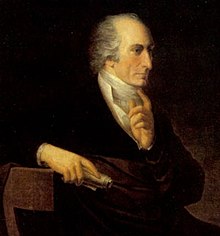فریدریش هاینریش یاکوبی
فریدریش هاینریش یاکوبی (به آلمانی: Friedrich Heinrich Jacobi) (۲۵ ژانویه ۱۷۴۳، دوسلدورف، آلمان - ۱۰ مارس ۱۸۱۹، مونیخ، آلمان) فیلسوف آلمانی بود که به سبب ابداع اصطلاح نهیلیسم مشهور است. [۱] [۲] [۳] [۴] [۴]
| فریدریش هاینریش یاکوبی | |
|---|---|
 | |
| زادهٔ | ۲۵ ژانویهٔ ۱۷۴۳ دوسلدورف، Electorate of the Palatinate، امپراتوری مقدس روم |
| درگذشت | ۱۰ مارس ۱۸۱۹ (۷۶ سال) مونیخ، پادشاهی بایرن، کنفدراسیون آلمان |
| دوره | فلسفه سده نوزدهم |
| حیطه | فلسفه غرب |
| مکتب | ایدئالیسم آلمانی |
علایق اصلی | Common sense realism، religious philosophy، متافیزیک، فلسفه اخلاق |
ایدههای چشمگیر | Glaube, Offenbarung, هیچانگاری |
تأثیرگرفته از | |
زندگینامه ویرایش
فریدریش یاکوبی در دوسلدورف متولد شد. او پسر دوم یک تاجر شکر بود. او با اینکه تحصیلات بازرگانی داشت ولی به زودی از تجارت دست کشید. وی علیه آموزش ناتورالیستی و تجربه باوری که در سوییس فرا گرفته بود واکنش نشان داد و به یک فرد پرشور مذهبی بدل شد. ایمان و احساس دو شعار فلسفه وی بودند.
عقاید ویرایش
یاکوبی منتقد تاثیرگذار فیلسوفان آلمانی دیگری چون کانت، هگل و مندلسون بود. او اولین کسی بود که به یک تناقض اساسی در فلسفهٔ استعلایی کانت رسید : با اینکه کسی نمیتواند بدون فرض وجود شیء-فی-نفسه به این فلسفه بپردازد، اما چنین اعتقادی سرانجام با آن فلسفه در تناقض است.
کتابشناسی ویرایش
آثار یاکوبی ویرایش
- Über die Lehre des Spinozas, in Briefen an Herrn Moses Mendelssohn. Breslau: G. Löwe, 1785.
- David Hume über den Glauben, oder Idealismus und Realismus. Breslau: G. Löwe, 1787.
- Sendschreiben an Fichte. Hamburg, 1799.
- Über das Unternehmen des Kritizismus, die Vernunft zu Verstande zu bringen und der Philosophic überhaupt eine neue Absicht zu geben. Hamburg, 1802.
- Von den göttlichen Dingen und ihrer Offenbarung. Leipzig, 1811.
- Jacobi's Werke, 6 vols. Edited by F. Roth. Leipzig: G. Fleischer, 1812–1825.
- Hauptschriften zum Pantheismusstreit zwischen Mendelssohn und Jacobi. Edited by M. Scholz. Berlin: Reuther and Reichard, 1916.
آثار نوشته شده در مورد یاکوبی ویرایش
- Ahlers, Rolf. «Vitalism and System: Jacobi and Fichte on Philosophy and Life.» Idealistic Studies 33 (1) (2003): 83–113.
- Behler, Ernst, ed. Philosophy of German Idealism: Fichte, Jacobi, and Schelling. New York: Continuum, 1987.
- Bowie, Andrew. «Rethinking the History of the Subject: Jacobi,Schelling, and Heidegger.» In Deconstructive Subjectivities, edited by Simon Critchley. Albany: State University of New York Press, 1996.
- Di Giovanni, George. «The Early Fichte as Disciple of Jacobi.» Fichte Studien 9 (1997): 257–273.
- Di Giovanni, George. «Fichte's Rhetoric of Deception: Reflections on the Early Fichte in the Spirit of Jacobi.» Revue Internationale de Philosophie 49 (191) (1995): 9–78.
- Di Giovanni, George. «From Jacobi's Philosophical Novel to Fichte's Idealism: Some Comments on the 1798–99 ‘Atheism Dispute.'» Journal of the History of Philosophy 27 (1989): 75–100.
- Di Giovanni, George. «The Jacobi-Fichte-Reinhold Dialogue and Analytical Philosophy.» Fichte Studien 14 (1998): 63–86.
- Franks, Paul. «All or Nothing: Systematicity and Nihilism in Jacobi, Reinhold, and Maimon.» In The Cambridge Companion to German Idealism, edited by Karl Ameriks. New York: Cambridge University Press, 2000.
- Janssens, David. «The Problem of the Enlightenment: Strauss, Jacobi, and the Pantheism Controversy.» Review of Metaphysics 56 (3) (2003): 605–631.
- Lévy-Bruhl, L. La philosophie de F. H. Jacobi. Paris: Alcan, 1894.
- Milbank, John. «Knowledge: The Theological Critique of Philosophy in Hamann and Jacobi.» In Radical Orthodoxy: A New Theology, edited by John Milbank, Catherine Pickstock, and Graham Ward. New York: Routledge, 1999.
- Schmidt, F. U. F. H. Jacobi. Heidelberg, 1908.
- Schmidt, James. «Liberalism and Enlightenment in Eighteenth- Century Germany.» Critical Review 13 (1–2) (1999): 31–53.
- Snow, Dale E. «F. H. Jacobi and the Development of German Idealism.» Journal of the History of Philosophy 25 (1987): 397–415.
- Solomon, Robert C. Introducing the German Idealists: Mock Interviews with Kant, Hegel, Fichte, Schelling, Reinhold, Jacobi, Schlegel, and a Letter from Schopenhauer. Indianapolis: Hackett, 1981.
- Westphal, Kenneth R. «Hegel's Attitude toward Jacobi in the ‘Third Attitude of Thought toward Objectivity.'» Southern Journal of Philosophy 27 (1989): 135–156.
- Williams, Robert R. «The Other: F. H. Jacobi and German Idealism.» In Hegel on the Modern World, edited by Ardis Collins. Albany: State University of New York Press, 1995.
- Wurzer,Wilhelm S. «Between Idealism and Dasein: Friedrich Heinrich Jacobi.» Dialogos 11 (1977): 123–136.
- Zirngiebl, E. F. H. Jacobi. Vienna, 1867.
منابع ویرایش
- ↑ Zalta, Edward N. (ed.). "Friedrich Heinrich Jacobi". Stanford Encyclopedia of Philosophy.
- ↑ Josephson-Storm, Jason (2017). The Myth of Disenchantment: Magic, Modernity, and the Birth of the Human Sciences. Chicago: University of Chicago Press. pp. 69–74. ISBN 978-0-226-40336-6.
- ↑ Breazeale, Dan (2001-08-30). "Johann Gottlieb Fichte" (به انگلیسی). Metaphysics Research Lab, Stanford University.
{{cite journal}}: Cite journal requires|journal=(help) - ↑ ۴٫۰ ۴٫۱ One or more of the preceding sentences incorporates text from a publication now in the public domain: Chisholm, Hugh, ed. (1911). "Jacobi, Friedrich Heinrich". Encyclopædia Britannica (به انگلیسی). Vol. 15 (11th ed.). Cambridge University Press. pp. 115–116.
- "Stanford Encyclopedia of Philosophy" (به انگلیسی). p. Friedrich Heinrich Jacobi. Archived from the original on 14 December 2012. Retrieved 17 Jan 2008.